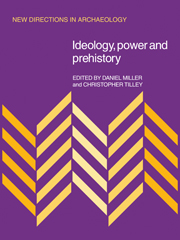Book contents
- Frontmatter
- Contents
- List of contributors
- Preface
- Part one Theoretical perspectives
- Part two Ideology and Power in the Present and Historical Past
- Part three Ideology and Power in Prehistory
- 5 Burials, houses, women and men in the European Neolithic
- 6 Economic and ideological change: Cyclical growth in the pre-state societies of Jutland
- 7 Ritual and prestige in the prehistory of Wessex c. 2,200–1,400 BC: A new dimension to the archaeological evidence
- 8 Ideology and the legitimation of power in the Middle Neolithic of Southern Sweden
- Part four Conclusions
- Index
6 - Economic and ideological change: Cyclical growth in the pre-state societies of Jutland
Published online by Cambridge University Press: 05 March 2012
- Frontmatter
- Contents
- List of contributors
- Preface
- Part one Theoretical perspectives
- Part two Ideology and Power in the Present and Historical Past
- Part three Ideology and Power in Prehistory
- 5 Burials, houses, women and men in the European Neolithic
- 6 Economic and ideological change: Cyclical growth in the pre-state societies of Jutland
- 7 Ritual and prestige in the prehistory of Wessex c. 2,200–1,400 BC: A new dimension to the archaeological evidence
- 8 Ideology and the legitimation of power in the Middle Neolithic of Southern Sweden
- Part four Conclusions
- Index
Summary
A comparison of the ritual and profane aspects of Germanic society in Jutland, Denmark, from 500 BC to AD 600, as interpreted from funerary, votive and settlement contexts, highlights the accumulation of worldly power through the sacrifice of precious goods to the supernatural. The whole period was one of increasing wealth-destruction which halted abruptly in the seventh century AD. Agricultural production expanded until the fifth century when there occurred an economic crisis which continued into the sixth century. Within this long-term cycle of expansion and decline were three smaller cycles. In the first (500–50 BC) increasing quantities of prestigious items were sacrificed as votive offerings. At the end of the cycle they were placed in graves and no longer in votive contexts, possibly representing a transition in spiritual allegiance from deities of the bogs, lakes and other natural features, to ancestral powers. At the same time there were important changes in the privatization of agricultural property. In the second cycle (50 BC–AD 200) there was a cumulative increase in wealth-items as grave goods, accompanying a gradual elaboration and reworking of ritualized roles and categories. After a period of social unrest in the third century there was another increase in the removal of gold and silver from circulation (either in a single ‘horizon’ or gradually) between AD 400 and 600. Agricultural expansion and technological innovations within each cycle accompanied progressively unequal social relations.
- Type
- Chapter
- Information
- Ideology, Power and Prehistory , pp. 69 - 92Publisher: Cambridge University PressPrint publication year: 1984
- 16
- Cited by



